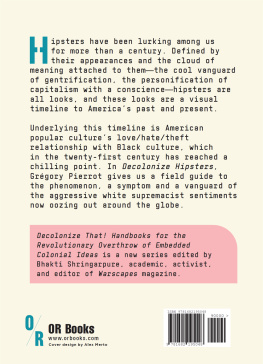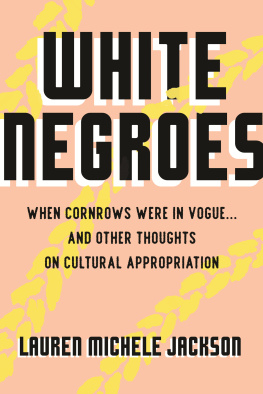


Forthcoming from Decolonize That! Handbooks for the Revolutionary Overthrow of Embedded Colonial Ideas
Edited by Bhakti Shringarpure
Decolonize Museums by Shimrit Lee
Decolonize Drag by Kareem Khubchandani
Decolonize Environmentalism by Prakash Kashwan & Aseem Hasnain
Decolonize Multiculturalism by Anthony C. Alessandrini
Decolonize Journalism by Asim Rafiqui

The Decolonize That! series is produced by OR Books in collaboration with Warscapes magazine.
2021 Grgory Pierrot
Published by OR Books, New York and London
Visit our website at www.orbooks.com
Lyrics from Merchandise by Fugazi excerpted with permission from Dischord Records.
All rights information:
All rights reserved. No part of this book may be reproduced or transmitted in any form or by any means, electronic or mechanical, including photocopy, recording, or any information storage retrieval system, without permission in writing from the publisher, except brief passages for review purposes.
First printing 2021
Cataloging-in-Publication data is available from the Library of Congress.
A catalog record for this book is available from the British Library.
Typeset by Lapiz Digital Services. Printed by BookMobile, USA, and CPI, UK.
paperback ISBN 978-1-68219-504-8 ebook ISBN 978-1-68219-251-1
CONTENTS
EDITORS PREFACE
Why would the first book of the series Decolonize That! Handbooks for the Revolutionary Overthrow of Embedded Colonial Ideas take a shot at hipsters? How can white youth in skinny jeans and ironic t-shirts attempting to recycle mason jars and brew decent craft beer be held responsible for colonialism? If anything, hipsters are associated with progressive values and for attempting to carve a space outside of the cultural and economic mainstream. Youre probably thinking its because hipsters are now associated with capitalism. The twenty-first-century hipster has unabashedly allowed the hipster lifestyle to turn into a marketable and profitable brand. In fact, the hipster aesthetic has become not just a panty cut, but also a cocktail, a succulent, a set of fonts, and also, weirdly, a bunch of food items (think pickling). We bump into hipster lifestyle elements so frequently that we no longer recall their supposedly progressive beginnings.
Sure, consuming mainstreamed white culture in slick and cool packaging is definitely a big part of the problem, but thats not really what Decolonize Hipsters is about. In his fierce, funny and sometimes shocking book, Grgory Pierrot takes a deep dive into gentrification, cultural appropriation, and white supremacy, all undergirded by the one thing most dear to him: music. More importantly, he forces the reader to reckon with that tiresome thing: history. And by history, I mean colonial history.
Gregs book begins in the hipster heartland: Portland, Oregon. He finds himself part of the most Portlandian of all activities: a birdwatching event called Swift Watch where people gather to watch over a thousand types of migrating birds. Looking around, Greg realizes quite suddenly that hes the only Black man amidst a sea of tattooed, fit, casually but smartly dressed, sun-kissed, cool white folk. A fairly banal epiphanyWhy is Portland so fucking white? unleashes a hell ride in which histories of slavery, jazz, punk rock, cool-hunting, bohemian art, and fascist hairstyles come together to paint a new portrait of white culture.
A singularly important intervention in the book is Gregs ability to trace the history of hipsters to the histories of appropriating cultures born out of transatlantic slavery. The history of hipsters is a not-so-secret history of race in the Atlantic world, he writes, revealing the fetish for all things Black and creole, whether it was music, dances, or dresses that were mimicked and appropriated by white bohemians on both sides of the Atlantic and transformed into what weve come to see as cool and hip. No surprise, then, that one of the iconic texts on this topic is Norman Mailers 1957 essay The White Negro: Superficial Reflections on the Hipster, which despite the ghastly title manages to get to a nugget of truth: that hipsterdom is all about chasing after Blackness, and is inevitably just as vague, extractive, and racist as that sounds.
Decolonize Hipsters is unsparing; perhaps that should be true of any decolonial project. Mostly, it refuses to cut any slack to the smug white progressive whose inclination towards narcissism and self-indulgent wokeness can often ring hollow in the face of activism towards anti-racism and militant feminism. As #decolonize becomes... well, hip, and has today alone yielded a half-million tags on Instagram, a rap on some white hipsters knuckles is much needed. There is no one more ubiquitous than a hipster, and no bigger irony than a history that insists on being seen as radical and progressive while relying so much on an all-powerful, all-encompassing whiteness. For those puzzled at the current rise of white supremacy or the ascendance of the Proud Boys, or if youve wondered who exactly were those bearded, costumed and armed men attacking the Capitol on January 6, 2021, Gregs book shows that those undercurrents have been there all along, and live dangerously on through hipster fashion, retro hairdos, callous gentrification, and shameless appropriation.
What makes this book so special is Gregs easy fusion of his professorial expertise in nineteenth-century African American and Caribbean studies with fluency in music and popular culture. Sharp and stylish, the book doesnt hesitate to draw from hilarious personal anecdotes, many of which take place in Gregs native France, revealing that classy and bohemian Europe is no beacon of progress. The books ability to link this unusual phenomenon with a toxic coloniality that weve ended up absorbing so unthinkingly makes it revolutionary. It is not merely timely, but head-turning, making us rethink, undo, unlearn, decenter, decolonizethe perfect way to launch the Decolonize That! series, which was conceived to solidify, declutter, and engage the push towards decolonization that is returning with a vengeance today.
Our new century has been marked by global mass mobilization for social justice, with the Arab Spring, the Movement for Black Lives, #MeToo, #FeesMustFall and Antifa signaling a strong desire and motivation to work towards overhauling social, political, cultural, economic, and institutional structures perceived as hegemonic, discriminatory, and oppressive. Evolving in tandem with these large social movements are smaller and less visible cultural shifts playing a significant role in shaping these movements, often providing them with politically coherent and historically grounded direction. The most prominent among these include the debates around decolonizing education in universities in Europe and the United States; the 2018 report released in France blowing the whistle on the historical theft of the thousands of African artifacts displayed in their museums; and lastly, the campaigns to raise awareness about the histories of violence and displacement of Indigenous peoples elided by American holidays such as Columbus Day and Thanksgiving.
Next page
















